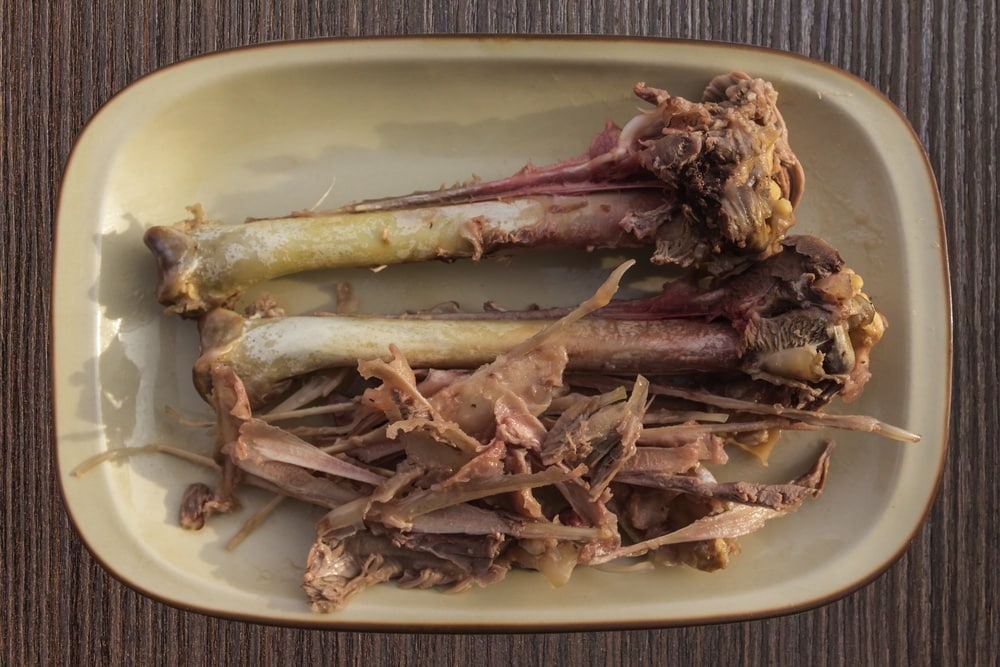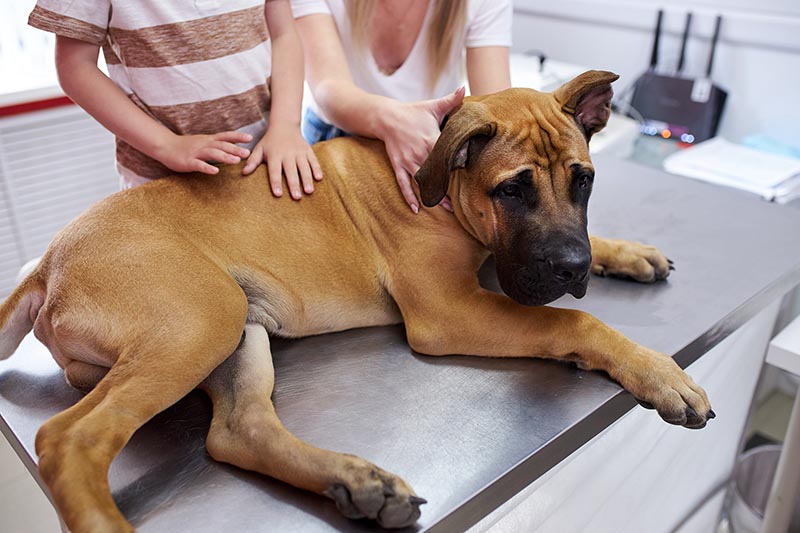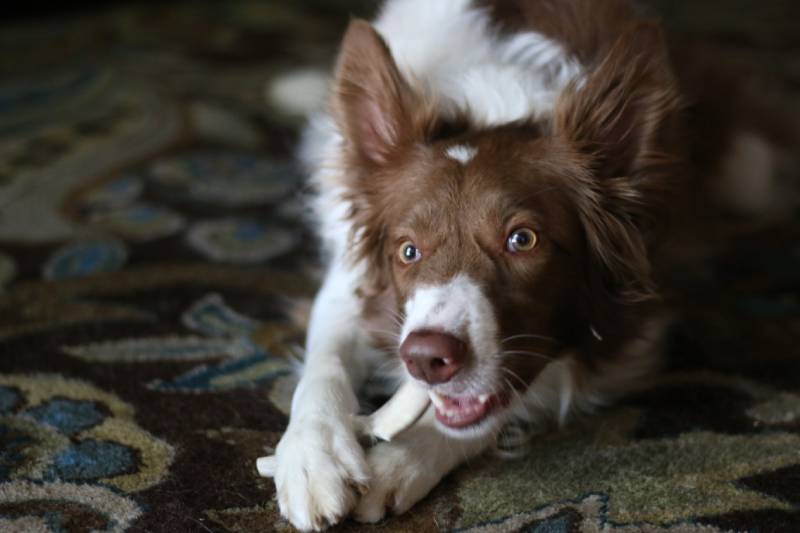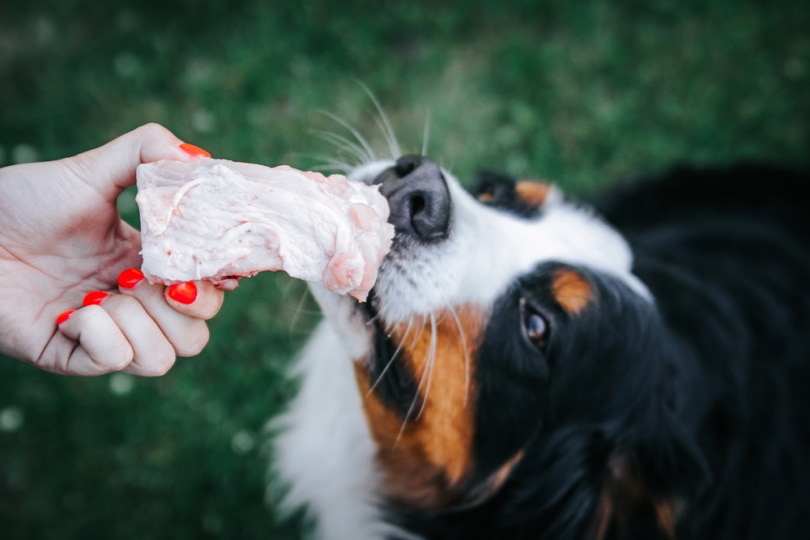
Click to Skip Ahead
You know the old nursery rhyme that happily instructs us to “…give the dog a bone”? Well, that might not be the best idea, as it turns out. Dogs love bones, but bones don’t always love dogs. Feeding dogs bones is a personal choice for your own dog but before you do, be aware of the risks. There are several stringent rules for giving your dogs bones, but certain bones should never be fed and any bone comes with risks. In particular, turkey bones and the bones of all other poultry should never be offered to your dog, particularly if they have been cooked.
Cooked bones become very brittle, and poultry bones have the propensity to splinter. These fragmented bones are akin to them being fed tiny little daggers. There is a strong potential for the dangerous shards to cause damage to the mouth and digestive tract.
What Can Happen If My Dog Eats a Turkey Bone?
Canine self-discipline tends to go out the window when a turkey defrosts on the counter or a plate of turkey scraps is next to the sink. Even the most angelic canine will metamorphose into a cunning thief to get their meaty fix. Turkey bones might be ingested, either raw or cooked, by your precious fur child.
Raw Bones
They might be ok if they get into the raw turkey carcass and gobble up the uncooked bones. Raw turkey bones don’t splinter like cooked turkey bones do, so they are more likely to pass through the digestive tract. Dogs can at least partially digest small fragments of raw bones. However, these bone fragments will not dissolve completely in the stomach. Sometimes the bones can form an intestinal obstruction which needs urgent surgery. Sometimes they reach the rectum but cause constipation or rectal bleeding as they are sharp and difficult to pass.
Raw poultry is also a problem since it may contain salmonella or other pathogens that are normally destroyed during cooking.
Cooked Bones
If your dog eats a plate of turkey scraps from Thanksgiving dinner, that is more of a cause for concern. The cooked bones will be brittle as a result of the cooking process, and they could splinter into sharp pieces with the potential to cause damage to the mouth, throat, and digestive tract.
Cooked bones are also more difficult for dogs to digest as their chemical composition is altered during cooking. The potential for complications such as blockages in the throat, esophagus, and intestines or physical damage to the delicate tissues of the digestive tract and mouth is a real concern.

What Should I Do If I Discover They Have Eaten a Turkey Bone?
It’s important to remain calm—if you panic, your dog will almost certainly pick up on your anxiety and become stressed. You are of more use to your dog if you stay calm. Additionally, there may be absolutely nothing to panic about. Your dog may suffer no adverse effects following their turkey bone misadventure.
Call your veterinarian for advice about what to do and what to look out for.
Check The Mouth
First, you should check their mouth for any bones. A visual check is best. Watch them for signs of choking and look inside their mouth. If you’re confident, you could also sweep around their mouth with a finger to feel for any bones.
Avoid sticking your fingers in their throat, however, as you might cause an obstruction to worsen if you accidentally push the bone in further. If they are breathing normally and appear relaxed in all other respects, then everything is probably fine. If you observe any gagging, retching, excess salivation, pawing at their mouth, excessive thirst, or anxiety, keep them calm and get them to the vet immediately. Do not try to remove stuck bones yourself; that is a job for your veterinarian.

Monitor Them Closely
Even if your canine looks 100% fine following their bone binge, you should continue to monitor them closely for the next 3 days. During this time, look out for bloody stool, diarrhea, constipation, lethargy, vomiting, discomfort, and loss of appetite. An emergency vet visit is warranted if you observe any of these signs. Three days is how long it will take for the bones to be eliminated from their system and for any potential danger to pass.
During the monitoring period, you should include soft foods with high fiber such as cooked pumpkin to help with the passing of the bones. Do this in consultation with your vet; they may recommend alternative treatments based on your situation.
Are There Any Bones That Dogs Can Safely Eat?
No bone is without risks. Some vets and pet nutritionists recommend bones for dental health and others say to avoid them completely. Consider alternatives such as brushing your pet’s teeth or a dental chew for dental hygiene. If you decide to feed your dog bones, only serve the raw bones. Never feed cooked bones. Choose a large bone that’s wider than the dog’s muzzle.
Keep in mind large bones can contain too much fatty marrow and can fracture your dog’s teeth as they are so hard.
Be sure you trust the source of the raw bones since they can carry harmful pathogens. Once again, consult your veterinarian about whether it is appropriate to feed bones, which bones are best for your dog, and how often you should offer them. It’s a good idea to provide bones after a meal and allow 10 to 15 minutes for them to chew them.
You should supervise their bone time so that you can remove the bone if it starts breaking into small pieces. Bones should be discarded after a few days since they will start to become unhygienic. As an alternative to animal bones, chew toys and fake bones provide many of the benefits that real bones do.

Tips For Keeping Your Dog Away From Turkey Bones
The best course of action to prevent a bone-eating mishap is to make sure that they’re out of reach. As soon as you are finished eating, put away all the leftovers in the refrigerator. Throw away the scraps and remove the trash, which should be stowed in a dog-proof trash can. It helps if you don’t get into the habit of feeding your dog treats while you’re at the table.
That confuses them since they believe your food is theirs and won’t think twice about helping themselves at any time. If it’s a Thanksgiving turkey, keep it covered at all times.
Frequently Asked Questions
You may have several questions and concerns if your dog has ever eaten turkey bones. Look at the frequently asked questions below to see if they answer any of yours.
Can My Dog Get Sick From Eating Turkey Bones?
Yes. An intestinal obstruction or constipation can make your pet very unwell. They can also experience an upset stomach if they eat too much turkey and can pick up nasty bacteria from raw turkey.
Can All Dogs Eat Bones?
No, not all dogs can eat bones. That’s why it’s best to approach bones with caution. Some dogs have medical conditions, such as dental disease, that prevent them from enjoying any bones. Very young dogs and old dogs might also not handle bones well. Certain breeds, particularly the brachycephalic ones such as Pugs, Shih Tzus, Bulldogs, and Boxers, may struggle with bones due to their flat faces.

Can Dogs Digest Bones?
Yes, dogs can digest some bones in small quantities that are less dense and small. Their digestive systems are not comparable to hyenas and other wild dogs that cope well with bones.
Conclusion
Until you have had that all-important chat with your veterinarian, it’s best to err on the side of caution and avoid bones altogether. They may be a mesmerizing and tasty treat for your dog, but feeding them is not without risk. Cooked turkey bones are especially hazardous, and they must be kept out of the reach of your beloved canine.
Featured Image Credit: sheris9, Shutterstock








